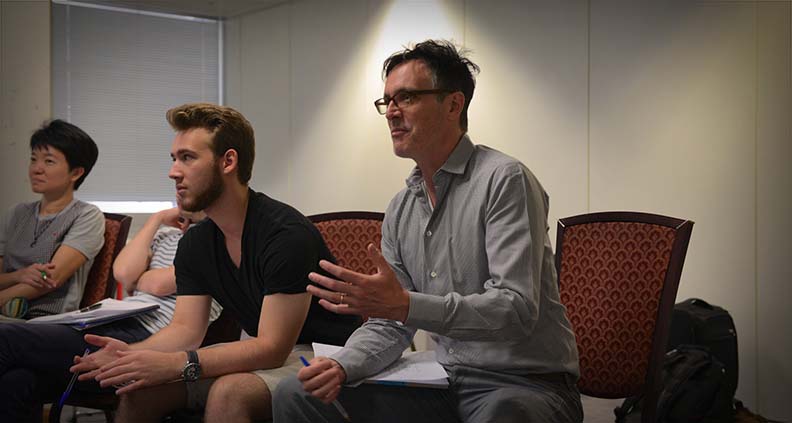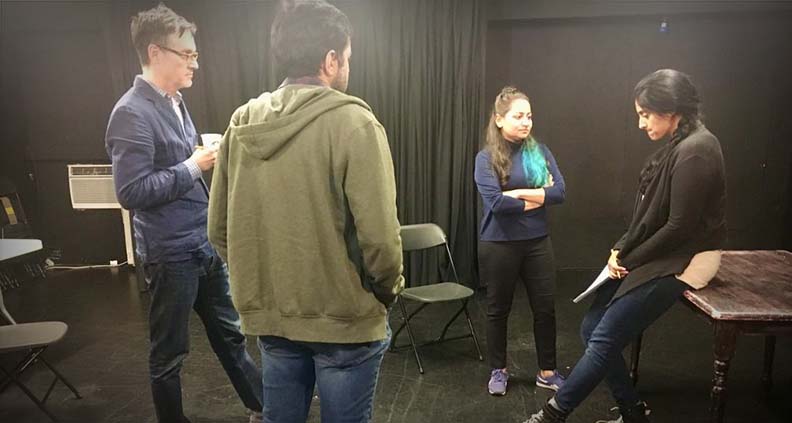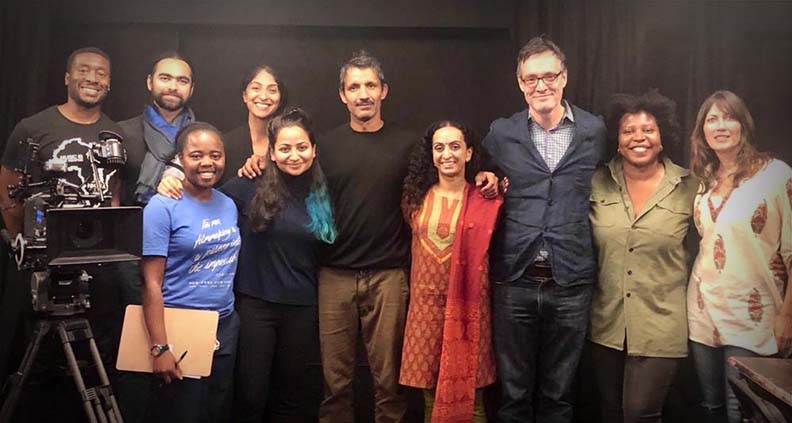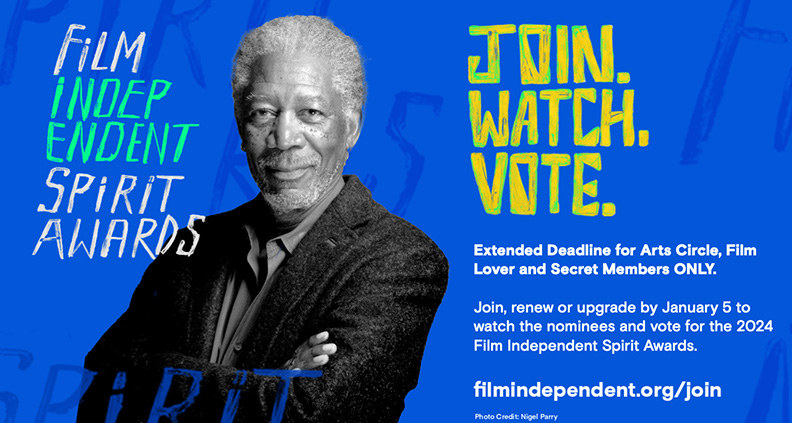Best of 2023: How To Get Great Performances Out Of Actors – A Directors’ Toolkit
To celebrate the end of another great year in independent film, Film Independent is re-posting some of our favorite blogs of 2023. And here’s a reminder: there’s still time to make a tax-deductible donation to Film Independent in support of all the hard work our community does year-round. Not a Member yet? Become one by January 5 to watch the nominees for the 2024 Film Independent Spirit Awards and vote for the winners. Happy New Year!
In preparation for a film shoot, the director’s tasks are myriad; everything from laboring to draw storyboards to bulk-buying Poland Spring bottles and Nature Valley bars at Costco. It’s strange then that so many filmmakers—veterans and newbies alike—take such a laissez faire attitude toward performance. It’s not enough to simply hire talent. A director’s job is to negotiate their performers’ disparate processes into a total cohesive organism. And like a carpenter whose work belt sags under an arsenal of calipers and clamps, a good director shows up to set with all of their tools in place and ready to go.
Directing tools—10 of them, to be specific—are at the heart of Film Independent’s upcoming Tookit “Directing Actors: Getting Great Performances” to be taught by filmmaker and instructor Brad Barnes (The Locksmith), whose returns to Film Independent’s Wilshire Boulevard HQ next week, April 11-14. For a testimonial as to the workshop’s efficacy, look no further than yours truly. That’s right—your humble Digital Content Manager took Mr. Barnes’ workshop last year in preparation for his feature film debut.
Personally, I can say Brad’s practical insight and coaching system helped our production immeasurably. For a preview of what to expect next week—which, register today if you haven’t already—we got Brad on the phone to discuss his toolkit, building trust with performers and the importance of reacting on set rather than dictating.
BRAD BARNES

So I actually took the Great Performances Toolkit last year in preparation for shooting my first feature, and it was really helpful. I’m curious: is there anything you learned during the course of making your first film you wish you knew going in?
Barnes: You know the thing with actors that endlessly fascinates me is the fact that every actor works though their own personal process, even actors who are identically trained. So I always come out the other side having new intimate knowledge of how a human being gets around acting challenges. What works for them; what adjustments they absorb readily; which are less helpful. You don’t know going in how everybody likes to work. You can ask questions and start the process at the audition stage, but you don’t really know until you’re under the pressure of the shooting day. For me, that’s the fun and art in it. You’re constantly adding to your own toolbelt.
People often think of directors as these dictator-like figures. But I found it to be much more reactive experience. Do you agree?
Barnes: I like the word reactive. I truly believe that our job—when we’re directing—is to be the actor’s first, best audience. Sometimes that’s a struggle, to become as present with your actors as you’re hoping they are with one another. Sometimes you have to remind yourself, or at least I do, “My first responsibility here is to watch these human beings and make sure I’m responding to what they’re actually doing.” We prepare as much as we can, but once that preparation is done and we’re on set it’s our responsibility to react to the headway the actor is making and continue helping them make new discoveries.

In general, how would you describe you philosophy of directing performances?
Barnes: I teach along with Adrienne Weiss, who’s based in New York. We teach a 10-tool approach which can be used to adjust any performance. What’s wonderful is that I can approach any scene using the tools as a sort of checklist to determine where I can be helpful. What’s missing in some directing courses is a comprehensive system. What I love about working with these tools is that I’m not stuck approaching the scene with the same old technique; I have many ways with which to adjust the scene and solve scene problems.
What’s an example of one of these tools?
Barnes: One that I really love is going in depth into The Moment Before. I see “moment before” problems all the time in the cutting room. That the actors have come from nowhere, that the opening half-page of the scene is flat and the editor can’t get it to work. So you want to be able to back that actor up and have them enter a scene having had an emotional experience just prior. Sometimes you haven’t shot that moment before. Sometimes you have, and you have to remind that actor to connect back to where they’re coming from. One tool that only really Adrienne and I teach, as far as I know, is called Contrary Expectation. To me, that means entering a scene with the expectation that it will go in some way other than the way it’s scripted. That’s a really fun one, to help an actor have an expectation of a scene that will not be met.
Those are two great ones. I used both of those on the set of my film.
Barnes: Yeah, and I feel like we do a pretty good job simplifying some of the ways to understand approaches that exist in other methods but perhaps aren’t defined as granularly. One is simply your scene objective, aka intention, aka your scene want. What I really love is how we encourage actors to raise their want: What do I want my scene partner to say or do? It’s that specificity, the thing that the actor’s scene partner won’t give them, that’s what’s going to provide that rising tension and make the scene more dramatic.

And then there’s the interconnectedness of all the tools.
Barnes: Even in the thumbnail I just gave you, I hope you can feel how there’s an interconnected quality to these 10 tools. For me, that’s what drew me to it and what makes me still want to teach it. That, to me, is endlessly fascinating.
You teach this approach in film schools, right?
Barnes: I taught this method for 10 years at Columbia University and now I teach it at USC. I love coming to Film Independent because I get to meet new directors and we get to try things out. For me, I’m not interested in replacing anyone’s technique they may already have—I’m interested in augmenting it.
Lastly: I was curious if you’ve ever encountered a situation on set you just couldn’t crack for some reason, or that was extremely difficult to crack, even with all these tools.
Barnes: That can happen. It’s happened to me and I can point to exactly why. You may remember when I introduced the tools, before we started to enumerate on them in any way, I talked about the idea of building trust with your actor, so that you can truly collaborate. It usually starts with one question: “How do you like to work?” If you lose an actor’s trust that’s where it sort of doesn’t matter how many tools you have. So whenever I meet a new group of directors, that’s always where we start the conversation.
Film Independent promotes unique independent voices by helping filmmakers create and advance new work. To become a Member of Film Independent, just click here. To support us with a donation, click here.
